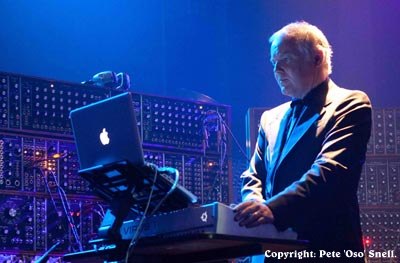
|
The Sound Behind the Music Wesson has worked on such successful films as Hannibal, Pirates of the Caribbean, King Kong (2005), Transformers, The Dark Knight or Inception. He is actually working on the Christopher Nolan‘s highly anticipated conclusion to the Batman saga: The Dark Knigh Rises. BSOSpirit: Good morning, Mel. First of all, thank you very much for agreeing to do this inteview. We know you are really busy these days. Since your job is still largely unknown for movie music fans, How could you describe your role to let other people know more about it? What is your task as an ambient music designer ? Mel Wesson: Really it’s about creating a sonic identity for a project, utilising the space between the score and the sound design, but also introducing other elements and musical ideas throughout the score. BS: So…What do the director, producer and the lead composer of a film expect from you when they hire you as an ambient music designer? MW : They want ideas! BS : And the ideas can come to the composer’s mind when he is thinking about colors, textures… what about you? And what is the biggest challenge you have to face when you start a new project? MW : I don’t think any differently, it’s all about colours and textures, emotions and story telling. The biggest challenge is having ‘The’ idea… really it’s often one train of thought, an idea that unlocks the whole project for me. Once you have that things start to fall into place… hopefully! BS: Once you have found that «key» , How do you create the soundscape ? Do you record sounds from the real world and then you manipulate them? Do you use sound libraries with rhythms and frequencies? BS : How is the process between creating your sounds and writing the music? Do you have to know what the composer is writing in a very specific way to know if your ambient sounds will fit in each cue? What could you ask the composer to make you job easier? MW : I work mostly with Hans Zimmer or James Newton Howard these days so we know each other tastes and expectations. Most of the time I’m left to my own devices there’s a lot of trust involved. Quite often I’ll have pushed ahead through the picture laying down ideas before James or Hans has written the cue, other times I work around what they’ve written, sometimes what I do never meets the score until the dub. The important thing is we’re all working with the same concept in mind. As for making my life easier… maybe Hans and James would move to London! BS :Ahaha, sure! Zimmer, Newton Howard, Jablonsky.. When do you think composers started to realize the importance of your work? Can you remember any turning point? MW : It was after Hannibal when people started to notice I was doing something different… but I soon learnt not to spread myself too thin! BS : Hannibal was realeased in 2001 but your relationship with Hans Zimmer started 20 years ago in some of his earlier films: Diamond Skulls and A World Apart. Although it wasn’t until Mission: Impossible 2 when you started to collaborate regularly with him. How was reteaming with him? How did you become the ambient music designer in his scores? BS : And it seems he really liked what you did , because since then you have been involved in almost every Hans Zimmer score, including two of my favorites: Black Hawk Down and Tears of the Sun. It seems your task in those scores was to link such a large ensemble of soloists and instruments. You created a really visceral and immersible sound for those movies. How was it to work in such a unique and changeling projects? How did you approach such hyper realistic films without pushing too much the viewer’s emotions? BS : Now that you mention extreme measures…we have to talk about one of them: Batman Begins. The “Bat-Flaps” that you created are now an iconic sound, as much as Don Davis’ overture for the Matrix films was. How did the idea come up? Can you tell us a little bit about your “research” process to get this specific and final sound effect? How involved were you when you had to arrange this sound in the film like in the interrogation scene between Batman and Joker in TDK? BS : You also worked in Christopher Nolan’s Inception . The score is not only a really popular one but an also an ambitious one as far as soundscapes are concerned. How was it creating the sound for such abstract concepts as time or dream ? BS : You performed Inception live at LA premiere, and at the World Soundtrack Awards in Ghent. You also worked in several bands including: “Siouxsie and the Banshees”, “Ash” or, more recently, in “Nightwish” singer Tarja Turunen’s solo album. Do you enjoy being on the stage playing music? What do you feel up there? MW : I love playing live, I spent many years touring, recording albums, doing the band thing and it’s still very much part of the way I think. I enjoy the whole band thing, the collaboration and live work is all about the fleeting moment, totally the opposite from the film world where everything you do is scrutinised for years to follow. I was in the studio recently with synth band Node, the plan is to be recording some more tracks later this year, it’s all about time and schedules though… BS :In a more traditional way you composed some additional music for movies like Spirit: Stallion of Cimarron or King Kong (2005) amongst many others. We can listen to more of your solo work in albums like Drones or Underscores at the website wwww.extrememusic.com. Would you like to be the main composer in a movie? Or would you be interested in releasing a non-soundtrack solo album as other ambient music composers like Steve Roach do? MW : Ahhh…. that question! I would love to score a movie yes BUT I’d like to have the opportunity to do it my way, in the same way that say Giorgio Moroder did on Midnight Express or perhaps more recently the way Trent Reznor or The Chemical Brothers have done. I’d love to record an album too, that’s been an ambition and I’ve started ideas many times. The problem is I get distracted by other work, but what I really want to do is work with some visual artists on some sound installations… the Venice Bienalle would be nice too! BS: There has been always much controversy regarding the use of electronic sounds in film scores. From Vangelis to Harold Faltermeyer. Media Ventures and Remote Control have been really popular for blending orchestra with synthesizers, and some fans seem to still react strongly against that and criticize this approach. This controversy is today more alive than it has ever been due to The Chemical Brothers’ score to Hanna and, of course, Atticus Ross and Trent Reznor’s Oscar Award-wining score to The Social Network. What do you think about such controversy? What would you say to all those film music fans who keep complaining about this? How do you see the future of film music?» MW : I don’t really see any distinction between orchestral and electronic music, they’re both equally valid forms of expression, surely what really matters is whether or not the score is the right score for the movie. Most of my work it’s about extending the sonic ranges of the soundtrack, to work with the orchestra, not against it, we’re all in the same band after all… that’s when things get exciting. Historically film has always been an evolving media but I’m sure the same arguments rage over CGI, computer animation and 3D. I’m more of an I-Max fan myself but that’s another can of worms… BS : Finally, I know you are not going to say anything but I still have to ask you, otherwise our readers are going to kill me: Can you tell us anything about The Dark Knight Rises? MW : I’d have to kill you… so it’s me or your readers! BS: I don’t want anyone killed, so we will have to wait! Thank you so much for your time and your music, Mel.
Thanks to Óscar Giménez and Yaiza Varona. Photos by Remote Control Productions and Pete Snell.
|
Author BIOGRAPHY: Mel was born and raised in London, despite numerous efforts to persuade him to follow a more conventional musical path he gravitated towards the synthesiser as his instrument of choice. After leaving art college the formative stages of Mel’s career saw him touring and recording with a number of new wave bands. Mel also began working out of Hans Zimmers’ Lillie Yard Studio where he began to explore the studio and experiment with sound and picture as well working with such artists as the punk icons Siouxsie and The Banshees, Brit Pop producer Mike Hedges and techno guru Youth. He received a multi platinum award for his contributions to The Verve’s ‘Urban Hymns’ album and the anthemic single ‘Bitter Sweet Symphony’. It was this album Hans Zimmer was listening to in the New Year of 2000 when he spotted Mel’s credit and invited him to work on the score for Mission Impossible 2. Since that time Mel has created his own niche within the movie score genre as ‘Ambient Music Designer’ . This area of atmospheric sound has weaved its way through many of Hans’ scores including Ridley Scott’s ‘Hannibal’ and ‘Black Hawk Down’. Christopher Nolan’s ‘Batman Begins’ , ‘The Dark Knight’ and most recently ‘Inception’. Sometimes ambient, sometimes disturbing, often unclassifiable, Mel’s music is always created with a passion and an artistic commitment. Outside of his feature film work Mel continues to write prolifically, he composes for commercial, television and video games and his production music can be heard throughout the world on various BBC, ITV, Discovery and MTV productions, CNN News broadcasts, Sky Comedy, Crime, Drama, Family, News, Sports and beyond.

|


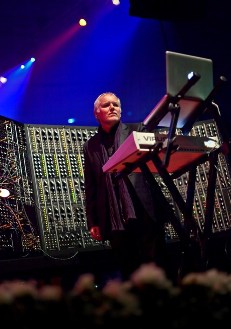 Mel Wesson is a versatile composer and arranger who during the last decade has revolutionized the concept of ambient music designer in film music. His work has succeeded in creating sound universes that surround and immerse the listener in an unique listening experience that goes beyond the images.
Mel Wesson is a versatile composer and arranger who during the last decade has revolutionized the concept of ambient music designer in film music. His work has succeeded in creating sound universes that surround and immerse the listener in an unique listening experience that goes beyond the images.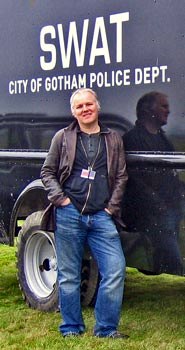 MW : Sometimes I use real world recordings, or quite often we organise sample sessions for a given project. I use a lot of old modular synthesisers and various computer programs so the process is a real combination of old and new technologies. The soundscapes are layered, arranged, mixed in exactly the same way as any other track would be. I never use sound libraries, everything I do is bespoke, that’s what makes the contribution worthwhile.
MW : Sometimes I use real world recordings, or quite often we organise sample sessions for a given project. I use a lot of old modular synthesisers and various computer programs so the process is a real combination of old and new technologies. The soundscapes are layered, arranged, mixed in exactly the same way as any other track would be. I never use sound libraries, everything I do is bespoke, that’s what makes the contribution worthwhile.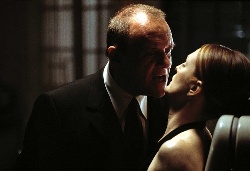 MW : Actually my relationship with Hans goes back over 35 years! We used to share sessions back in the late 70’s, then in the mid 80’s I was based out of his Lillie Yard Studio in London. When Hans moved to LA I was more interested in working with recording artists, it took me a few years to get that out of my system! He called me New Year 2000 after he saw my credit on an album he’d been listening to (The Verve – Urban Hymns) and asked me to come over for MI2. The ambient music idea didn’t come together until Hannibal. I had no idea what I could contribute to that score in a conventional sense but in the course of conversation Hans mentioned he wanted to give the soundtrack more of a Hannibal Lecter presence beyond the score. I spent months experimenting before I played Hans anything and I did warn him this was all a vast experiment…fortunately he liked what he heard.
MW : Actually my relationship with Hans goes back over 35 years! We used to share sessions back in the late 70’s, then in the mid 80’s I was based out of his Lillie Yard Studio in London. When Hans moved to LA I was more interested in working with recording artists, it took me a few years to get that out of my system! He called me New Year 2000 after he saw my credit on an album he’d been listening to (The Verve – Urban Hymns) and asked me to come over for MI2. The ambient music idea didn’t come together until Hannibal. I had no idea what I could contribute to that score in a conventional sense but in the course of conversation Hans mentioned he wanted to give the soundtrack more of a Hannibal Lecter presence beyond the score. I spent months experimenting before I played Hans anything and I did warn him this was all a vast experiment…fortunately he liked what he heard.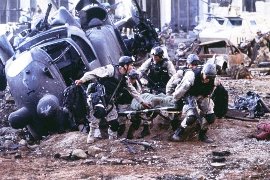 MW : Really Black Hawk Down was a far bigger project for me, it was all about sound, not just the score or my contributions but the relentless sounds design too. BHD was only my second ambient music project so I was still feeling my way through the process. It was raw too, very realistic and so was the process. Whereas on Hannibal we all had time to consider our next move, with BHD the production schedule was shortened so much we just had to react instantly to each scene and event. I don’t think anyone wanted to spare the viewer’s emotions, far from it, Ridley Scott wanted to push everything as far as we possibly could and Hans never needs to be pushed when it comes to extreme measures!
MW : Really Black Hawk Down was a far bigger project for me, it was all about sound, not just the score or my contributions but the relentless sounds design too. BHD was only my second ambient music project so I was still feeling my way through the process. It was raw too, very realistic and so was the process. Whereas on Hannibal we all had time to consider our next move, with BHD the production schedule was shortened so much we just had to react instantly to each scene and event. I don’t think anyone wanted to spare the viewer’s emotions, far from it, Ridley Scott wanted to push everything as far as we possibly could and Hans never needs to be pushed when it comes to extreme measures!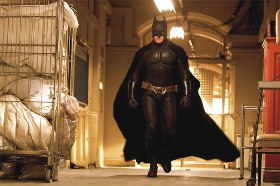 MW : I would love to take credit for the concept but that came from Hans. Taking that idea and making it into something we could weave in and out of the score was my job. It actually came together in a couple of days, I sent the rough idea over to Hans and then took it Chris Nolan who was cutting the picture in London and it grew from there. As you say the BatFlaps are used at certain points in the score of Dark Knight, those places were originally marked out in the temp score, I remember playing around with the interrogation scene, really just to nail them between the score and the on screen action… I’ll be going through that process again on DKR I’m sure.
MW : I would love to take credit for the concept but that came from Hans. Taking that idea and making it into something we could weave in and out of the score was my job. It actually came together in a couple of days, I sent the rough idea over to Hans and then took it Chris Nolan who was cutting the picture in London and it grew from there. As you say the BatFlaps are used at certain points in the score of Dark Knight, those places were originally marked out in the temp score, I remember playing around with the interrogation scene, really just to nail them between the score and the on screen action… I’ll be going through that process again on DKR I’m sure.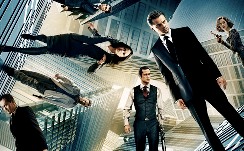 MW : Time in Inception was really played within the tempo of the score, we used multiples and divisions of our tempo to create a score that relates on many levels, in the same way the dreamscapes are all interwoven. As for the concept the of the dream, in the film Cobbs says «Remember Dreams feel real while we’re in them. It’s only when we wake up that we realize something was actually strange.», so the problem was NOT to give away the dream state to the audience… tricky, but I think we pulled it off!
MW : Time in Inception was really played within the tempo of the score, we used multiples and divisions of our tempo to create a score that relates on many levels, in the same way the dreamscapes are all interwoven. As for the concept the of the dream, in the film Cobbs says «Remember Dreams feel real while we’re in them. It’s only when we wake up that we realize something was actually strange.», so the problem was NOT to give away the dream state to the audience… tricky, but I think we pulled it off!
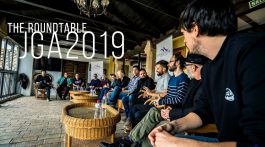
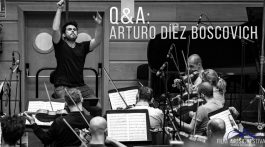
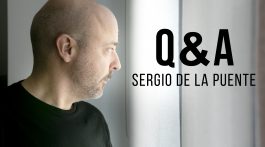
No hay comentarios